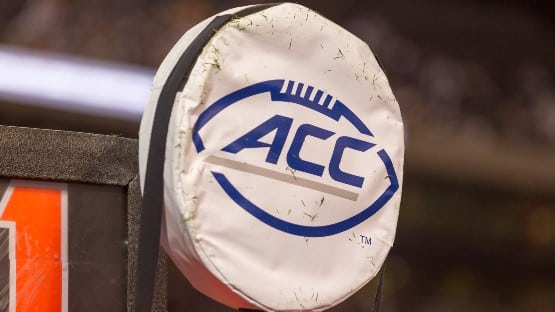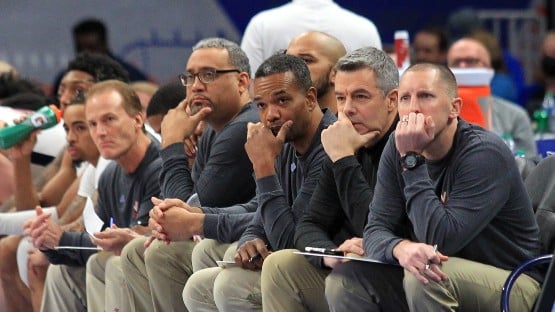
Are Virginia and Virginia Tech on the verge of leaving the ACC for greener pastures? There are 120 million reasons why they wouldn’t be.
And then heap on roughly 450 million more.
The exit fee for schools leaving the ACC is a cool $120 million, and on top of that, departing schools would lose revenue for their home games through the end of their grant of media rights to the conference, which runs through 2036.
The value of those media rights is, on the low end, $450 million.
That isn’t to say our local ACC schools haven’t been, you know, talking.
“I would classify it as a number of conversations, usually in small groups, on interpretations of grant of rights, of bylaws of the league, of options that may be out there. But as you know, the grant of rights has been looked at a lot of times by a lot of people,” Virginia Tech Athletics Director Whit Babcock told The Times-Dispatch.
T-D sportswriter David Teel, in an article covering the latest developments on the ACC revenue talks at this week’s ACC spring meetings in Florida, wrote that Virginia’s AD, Carla Williams, declined to comment, other than to say that “Whit speaks for both of us.”
So, there you go, confirmation that Virginia and Virginia Tech have been talking.
This news comes as the ACC spring meetings take place against a backdrop colored by reporting from Sports Illustrated that Virginia and Virginia Tech are among seven ACC schools – now, apparently, eight – that have actively been discussing exit strategies.
The push comes as their peers in the SEC and Big Ten are set to begin new media-rights deals that will distribute upwards of $30 million more per year per school than the ACC is able to pay out to its schools under the terms of the 20-year TV deal that the conference negotiated with ESPN in 2016.
It was Florida State AD Mike Alford who made the headlines earlier in the week with his complaint that even Central Florida, which is about to enter the Big 12 in a couple of months, could be making more money from its TV rights in the near future.
Florida State is among the seven, now eight, that have been actively exploring exit strategies – the list includes North Carolina, North Carolina State, Clemson, Miami and the latest entrant, Louisville.
Clemson and Florida State are the top TV draws in football, which is where the money is made in college sports broadcasting, and you’d have to assume both would be enticing to the SEC as possible members.
Virginia and North Carolina have been linked as possible expansion targets of the Big Ten for a while now.
One could see Virginia Tech and Louisville as targets for the Big 12.
This is all just speculation.
Or, is it?
Of note here is that Babcock declined to address a question from Teel on possible meetings of the eight with representatives of other conferences, which means, obviously, yes, they have.
That all said, it’s hard to see how an actual exit by one or more members would go down easily. It’s been assumed that the best way out would be for eight member schools – a majority of the ACC’s 15 – could vote to dissolve the league, which would take care of the rest, but it may not be that simple.
Landis Barber, an attorney at the Raleigh-based Safran Law, told SI that dissolving might not directly address the issue of the grant of media rights, particularly with ESPN, the rights holder.
“A big issue is, what is ESPN’s incentive to let you out of this?” Barber said.
The telling here is to give you a sense of the complexity of the situation facing the conference, and the school presidents and athletics directors.
The 20-year ESPN deal and the grants of media rights seemed like a good way forward back in 2016, but the massive payouts going to the SEC and Big Ten in their new media deals may push ACC schools to permanent underclass status if the presidents, ADs and ACC Commissioner Jim Phillips can’t figure out a way to bring in more money.
For now, all the suits can do is appease each other by coming to terms on ways to divide up their smaller pie to the liking of those who have been looking for a way out.
That’s the headline from this week’s spring meetings, that the ADs have come to a working agreement on scenarios in which programs are rewarded for success on the playing field with more money.
It ain’t much, but it’s a start – or resembles a start.
Or it could be appeasement on the level of Neville Chamberlain.
“We just need to be in a competitive boat,” Alford said. “We’re the third-best media agreement right now. We want to stay the third best. We need to be able to compete. As long as we’re there and competitive, that’s what the number is.”
“Do we think that will close the gap that everyone incessantly talks about? Not all the way, but making strides toward that, keeping in contact financially with the Big Ten and SEC and hopefully become a clear-cut third,” Babcock said.










